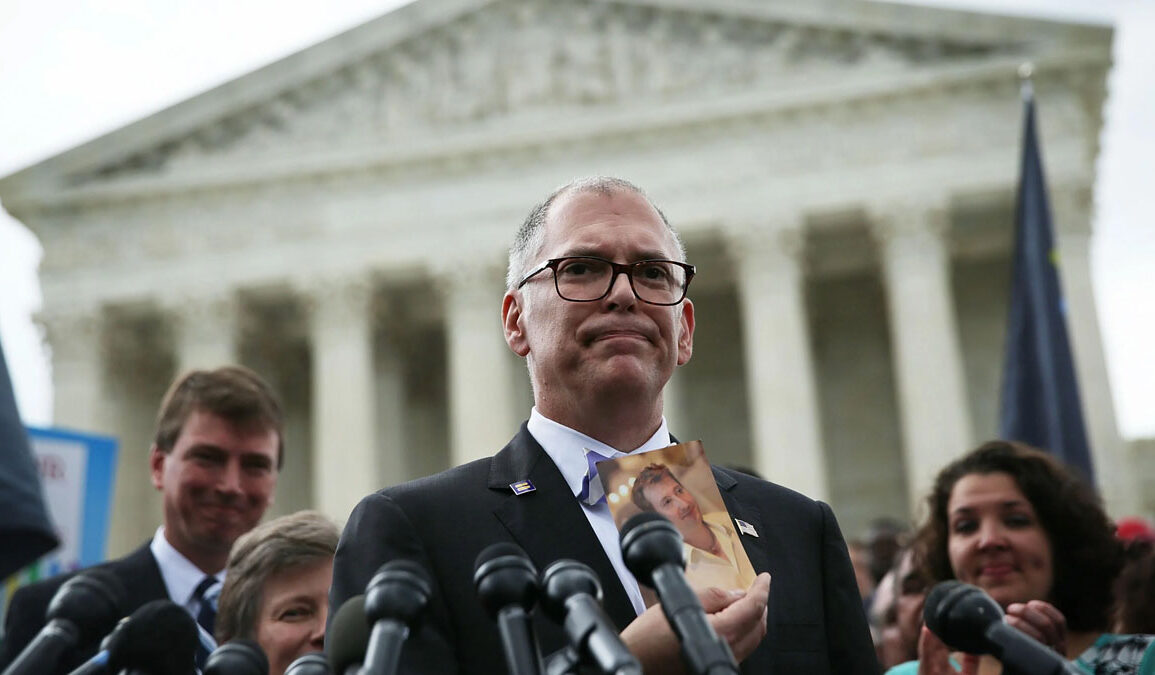The U.S. Supreme Court is quietly considering whether to reopen one of the most consequential cultural and legal battles of the 21st century. At issue is Obergefell v. Hodges, the 2015 ruling that guaranteed same-sex couples the constitutional right to marry. Nearly a decade later, the Court’s conservative majority could decide to take up a case that directly challenges that decision, a move that many advocates see as a potential turning point for LGBTQ rights in America.
The Case Behind the Challenge
The petition that has brought this issue back before the Court comes from Kim Davis, a former county clerk in Rowan County, Kentucky. In 2015, Davis became a national figure after refusing to issue marriage licenses to same-sex couples following the Obergefell ruling. She argued that doing so would violate her deeply held religious beliefs. Her refusal led to legal action from two men, David Ermold and David Moore, who were denied a marriage license.
Davis spent five days in jail for contempt of court after defying a federal order to issue licenses. A federal jury later ordered her to pay $100,000 in emotional damages and more than $260,000 in attorneys’ fees to Ermold and Moore. Now, through her attorneys, Davis is appealing to the Supreme Court to overturn those rulings and, more dramatically, to reconsider the very decision that legalized same-sex marriage nationwide.
Her attorney, Mathew Staver of Liberty Counsel, a Christian legal organization, insists that the 2015 decision was a constitutional mistake. “Like the abortion decision in Roe v. Wade, Obergefell was egregiously wrong from the start,” Staver said in a recent statement. “This opinion has no basis in the Constitution. The high court should overturn Obergefell and correct this grievous error.” He argues that the First Amendment protects Davis from being compelled to act against her faith while serving in public office.
The Legacy of Obergefell v. Hodges
The 2015 Obergefell decision was one of the most celebrated rulings in modern history for the LGBTQ community. In a 5–4 opinion written by Justice Anthony Kennedy, the Court declared that marriage is a “keystone of our social order” and that same-sex couples sought “equal dignity in the eyes of the law.” The ruling struck down state bans on same-sex marriage and required all states to recognize such unions.
Justice Kennedy, now retired, has defended the decision in recent interviews. “A powerful argument against overruling Obergefell,” he said, “is the tremendous amount of reliance that same-sex couples and their families have placed on the decision.” Kennedy’s opinion reshaped American family law and set off a wave of marriages that continue to this day. According to the U.S. Census Bureau, there are now about 823,000 married same-sex couples raising nearly 300,000 children.
But the Supreme Court has changed significantly since 2015. Three justices appointed by former President Donald Trump—Neil Gorsuch, Brett Kavanaugh, and Amy Coney Barrett—have shifted the Court further to the right. Of the original five justices who voted to legalize same-sex marriage, only Justices Sonia Sotomayor and Elena Kagan remain.
Fear of a Reversal
For James Obergefell, the man whose name became synonymous with the fight for marriage equality, the current situation is deeply troubling. “Absolutely, people should be concerned. I’m concerned,” he told Newsweek. “We now have a Supreme Court that has shown it is willing to turn its back on precedent, which had always been a bedrock principle for the Supreme Court.”
Obergefell said he recently officiated a wedding for his cousin, who asked whether it was safer to get married now instead of waiting. “My answer was yes,” he said. His worry stems from the fact that many states, including his home state of Ohio, still have old Defense of Marriage Acts on the books. “If Obergefell is overturned, Ohio could immediately say no more marriage licenses for queer couples,” he warned.
Hillary Clinton expressed similar alarm, predicting that the Court “will do to gay marriage what it did to abortion.” In an interview over the summer, she said that if the nationwide right were revoked, “fewer than half the states would recognize same-sex unions,” potentially creating legal chaos for married couples who move across state lines.
Divided Reactions and Shifting Politics
Support for same-sex marriage remains high among the American public. A May Gallup poll found that 68 percent of Americans support it, a level that has held steady for several years. Yet the partisan divide is the widest it has been in nearly three decades, with Republican approval far lower than that of Democrats or independents.
Advocates for LGBTQ rights argue that any move to revisit Obergefell would be devastating. Mary Bonauto, one of the attorneys who represented Obergefell before the Court in 2015, acknowledged that the political climate feels unstable but remains confident in the legal foundation of the decision. “I know everything is being thrown up in the air and feels unstable,” Bonauto said, “but the precedent affects our whole society. This is something that people need to be able to count on.”
Kevin Jennings, CEO of Lambda Legal, also warned against reopening the issue. “Nothing in the petition before the court justifies creating a patchwork of state laws excluding some families from marriage licenses in the states where they live,” he said. He called the right to marry “a cornerstone of equality” that has become deeply rooted in American life.
On the other side, opponents of same-sex marriage see Davis’s case as an opportunity to restore religious freedom and correct what they view as judicial overreach. “If ever a case deserved review,” Liberty Counsel argued in its petition, “the first individual who was thrown in jail post-Obergefell for seeking accommodation for her religious beliefs should be it.” Conservative activists have pointed to the Court’s 2022 decision overturning Roe v. Wade as proof that long-standing precedents can be reversed when found constitutionally unsound.
The Court’s Current Posture
It will take four of the nine justices to agree to hear Davis’s case. The Court held its first private conference on the matter on Friday, with a second expected later this month. If the justices decline to review the petition, the decision could be announced as soon as Monday. But if they agree to hear the case, oral arguments could come next year, reopening a debate many believed was settled.
Justice Clarence Thomas has already made his position clear. In 2022, when the Court struck down Roe v. Wade, he wrote that “in future cases, we should reconsider all of this Court’s substantive due process precedents, including Griswold, Lawrence, and Obergefell.” His statement is now being cited by Davis’s attorneys as evidence that some justices are willing to revisit the ruling.
Justice Samuel Alito, who also dissented in Obergefell, recently sought to temper expectations. “In commenting on Obergefell, I am not suggesting that the decision in that case should be overruled,” he said during a Washington lecture in October. “Obergefell is a precedent of the Court that is entitled to the respect afforded by the doctrine of stare decisis.”
Justice Amy Coney Barrett has also indicated caution, writing that the right to marry falls among “the rights that people have relied upon to order their lives in fundamental ways.” In a recent interview, she added, “Those are financial, those are medical, those are family reliance interests.”
A Decision with Far-Reaching Consequences
Even if Obergefell were overturned, same-sex marriages already performed would likely remain valid under the 2022 Respect for Marriage Act, signed by President Joe Biden. That law requires states and the federal government to recognize same-sex and interracial marriages performed elsewhere. However, it does not compel states to issue new marriage licenses if the constitutional right were withdrawn, meaning states with dormant bans could again deny them.
For couples like Emillie and Brooke Friedman of Maryland, the possibility of reversal is deeply personal. “Nothing is going to change the fact that Brooke and I are legally married,” Emillie said. “We are married in our hearts.” Still, she admitted that the Davis appeal “shocked and worried” her as they prepare to start a family.
The Court’s decision on whether to hear Davis’s case could come within days. For millions of Americans, it represents not just a legal question but a test of whether the country will reaffirm or retreat from the principle of equal dignity that defined Obergefell v. Hodges. As Justice Kennedy once wrote, “Their hope is not to be condemned to live in loneliness, excluded from one of civilization’s oldest institutions. They ask for equal dignity in the eyes of the law.”
That hope, and the precedent built upon it, now stands once again before the highest court in the land.








